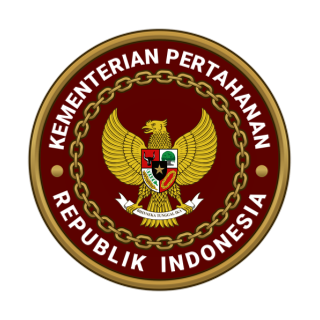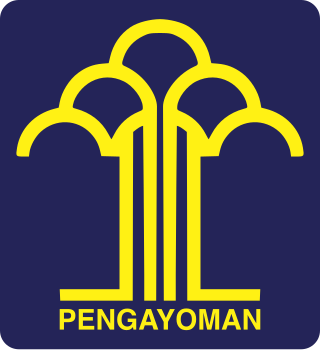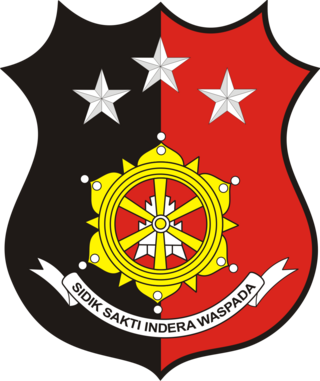A regency, sometimes incorrectly referred to as a district, is an administrative division of Indonesia, directly under a province and on the same level with city (kota). Regencies are divided into districts.
In Indonesia, village or subdistrict is the fourth-level subdivision and the smallest administrative division of Indonesia below a district, regency/city, and province. Similar administrative divisions outside of Indonesia include barangays in the Philippines, Muban in Thailand, civil townships and incorporated municipalities in the United States and Canada, communes in France and Vietnam, dehestan in Iran, hromada in Ukraine, Gemeinden in Germany, comuni in Italy, or municipios in Spain. The UK equivalent are civil parishes in England and communities in Wales. There are a number of names and types for villages in Indonesia, with desa being the most frequently used for regencies, and kelurahan for cities or for those communities within regencies which have town characteristics. According to the 2019 report by the Ministry of Home Affairs, there are 8,488 urban villages and 74,953 rural villages in Indonesia. North Aceh Regency contained the highest number of rural villages (852) amongst all of the regencies of Indonesia, followed by Pidie Regency with 730 rural villages and Bireuen Regency with 609 rural villages. Prabumulih, with only 12 rural villages, contained the fewest. Counted together, the sixteen regencies of Indonesia containing the most rural villages—namely, North Aceh (852), Pidie (730), Bireuen (609), Aceh Besar (604), Tolikara (541), East Aceh (513), Yahukimo (510), Purworejo (469), Lamongan (462), South Nias (459), Kebumen (449), Garut (421), Bojonegoro (419), Bogor (416), Cirebon (412), and Pati (401)—contain one-third of all the rural villages in Indonesia. Five of these are located in Aceh, two in Highland Papua, three in Central Java, two in East Java, three in West Java, and one in North Sumatra. An average number of rural villages in the regencies and 15 cities of Indonesia is 172 villages. A village is the lowest administrative division in Indonesia, and it is the lowest of the four levels. A village is usually divided into a number of hamlets, and there are 252,315 hamlets in Indonesia.

The Ministry of Foreign Affairs of the Republic of Indonesia or commonly known by its abbreviation Kemlu, is an Indonesian government ministry responsible for the country's foreign politics and diplomacy. The ministry was formerly known as the Department of Foreign Affairs until 2008 when the nomenclature changed with the enactment of the 2008 State Ministry Act.

The Ministry of Health is a government ministry which organize public health affairs within the Indonesian government.

The Ministry of Defense is an Indonesian government ministry responsible for the defense of Indonesia. The ministry was formerly known as the Department of Defense until 2009 when the nomenclature changed based on Act Number 39 of 2008 on State Ministries, the name of the Department of Defense was changed to the Ministry of Defense of the Republic of Indonesia. The currently-appointed minister is Prabowo Subianto, replacing Ryamizard Ryacudu on 23 October 2019.

The Ministry of Law and Human Rights is an Indonesian ministry that administers laws and human rights. It is responsible to the president, and is led by the Minister of Law and Human Rights, Yasonna Laoly, since 27 October 2014. The first minister was Soepomo.

The Ministry of State Secretariat is a government ministry responsible for providing technical, administrative, and analytical support to the President and Vice President in the exercise of their state powers. The current minister of state secretariat is Pratikno, who previously served as Rector of Gadjah Mada University in Yogyakarta.
Bokol is a village in the Kemangkon District, Central Java, Indonesia.
A rukun tetangga is an administrative division of a village in Indonesia, under a rukun warga. The RT is the lowest administrative division of Indonesia.

A rukun warga is an administrative division of Indonesia under the village or kelurahan. Rukun warga not including the division of administration, and the formation of local communities is through consultation in the framework of community service set by the village or villages. An RW is further divided into rukun tetangga (RT). Most information about governance and functioning of the RW and RT is in Indonesian. Some non-Indonesian anthropologists have written about the functions and issues of the RW.

Criminal Investigation Agency is one of central executive agencies of Indonesian Police Force. Bareskrim is led by Kepala Bareskrim / Kabareskrim, a three-star general in Indonesian National Police. Bareskrim conducts inquiries into a variety of criminal offences, initiates criminal investigations, identifies suspects, makes arrests, and is in charge of forensic laboratory. The agency is currently led by Komisaris Jenderal Polisi Agus Andrianto. Officers from this unit wear civilian attire on duty.
Abiansemal is a village (desa) and capital of Abiansemal District in the Badung Regency of Bali, Indonesia. As of 2016, the population was estimated at 7,215.
Blora is a town and district in Blora Regency, Central Java, Indonesia. The district borders Rembang Regency to the north, Jepon District to the east and south, and Banjarejo District and Tunjungan District to the west. It is also the administrative capital of Blora Regency. During the period of 1928–31, it was also the seat of Blora Residency.

Nusantara Capital City Authority is a cabinet level-agency formed by Indonesian government, working directly under the President of Indonesia. The agency will become a special agency tasked with managing and governing the city of Nusantara, future capital of Indonesia located on Kalimantan.

The National Population and Family Planning Board is a non-ministry government body for family planning. It was established 29 June 1970.













